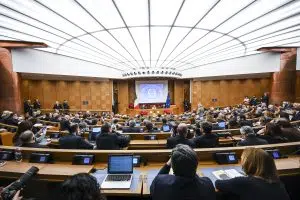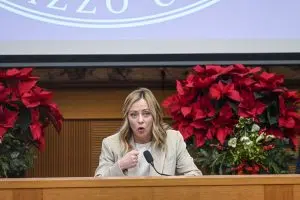Brussels – It will be a 2024 with a strong European and international focus for Italy. “There are many important deadlines this year, between the European elections and the presidency of the G7,” Premier Giorgia Meloni opened with these words the traditional end-of-year press conference, postponed to today (Jan. 4) for health reasons last week. From the June 9 election date to the issues that inflamed the end of last year—a new Stability Pact and the failure to ratify the European Stability Mechanism (ESM)—to the Migration and Asylum Pact and the pressing issue of artificial intelligence, the more than three-hour-long press conference focused on Rome’s relations with its partner countries.

The beginning of the discussion with the press for PM Meloni immediately involved a topic that is closely related to political dynamics in Brussels. “I have not yet made a decision on a possible candidacy of mine in the European elections, but I think that measuring myself against the consensus of citizens would be useful and interesting.” The president of Fratelli d’Italia stalled ahead of the June 9 election, raising, however, the possibility of a “high-level democratic test” if other party leaders make the same choice. Not shying away from a possible televised confrontation with the secretary of the Democratic Party, Elly Schlein, Meloni explained that the decision on her candidacy will depend on “how much time campaigning would take away” from her duties as premier, as well as the dialogue with the leaders of the other majority parties.
 The post-European 9 June election scenario is clear: “I work to create an alternative majority to Ursula’s, which
The post-European 9 June election scenario is clear: “I work to create an alternative majority to Ursula’s, which
has proven to be possible on some dossiers,” is PM Meloni’s confirmation, making it clear that otherwise “I have never been open to form a parliamentary majority with the left.” On the other hand, Meloni distanced herself from the French (Rassemblement National) and German (Alternative für Deutschland) far-right parties which belong to the European political family of Identity and Democracy along with the Lega—”they are not part of the European Conservatives and Reformists” of which Meloni is president—even though she urged them to “respond to the citizens” who represent 20 to 30 percent of the vote at the ballot box. The clarification about the vote on the future European Commission and its members was necessary: “It is our interest for our commissioner to be confirmed, but it is not a majority and will not be one.” The premier asked journalists to avoid predicting names for the presidency and European commissioners—thus dodging the answer to the question on a possible convergence on the name of Mario Draghi —since “those who know the dynamics of the commission understand that for now it is impossible” to go beyond reasoning on the “role of Italy in line with its importance” to define the priorities of the next mandate.
Meloni between Esm and beach resorts
Prime Minister Meloni’s attention focused also on other issues of European interest, besides the one of the 2024 election date, “I don’t think that failure to ratify the Esm should be linked to the Stability Pact,” with which the prime minister herself said she was “satisfied given the circumstances, even if it’s not what I would have wanted.” On the subject of the Esm, however, the controversy with former PM Giuseppe Conte, accused of having signed it “knowing that there was no majority to ratify it,” as evidenced by the year-end vote in the House of Representatives, was explicitly relaunched: “We know how the center-right parties and also the 5-Star Movement thought about it, and in fact they voted against it.” Meloni then relaunched the issue at the European level, calling the Esm an “obsolete instrument” and the non-ratification by Italy “can be an opportunity to modify it and make it more effective than it is today.”

The press conference of Italy’s first female minister, Giorgia Meloni, in Rome (Jan. 4, 2024)
Another thorny issue is that of thev extension of beach concessions, on which Prime Minister Meloni tried to defend herself by recalling that her government was “the first to have done a mapping of the coasts to define whether or not there is a principle of scarcity of the asset, which is fundamental in the Bolkestein directive.” The goal for 2024 remains “an overhaul that would allow us to put order to the jungle of interventions and pronouncements,” in parallel with a confrontation with the EU Commission “to avoid an infringement procedure and give stability to operators” in the sector.
Equally crucial will be continuing the confrontation with Brussels on migration—on which Meloni claims “new priorities in Europe that are the ones we are asking for”—after the agreement between the EU institutions on the Migration and Asylum Pact: “I consider the new rules better than the old ones, but this is not the solution, we will never solve the problem if we do not work upstream on departures.” And finally artificial intelligence, the “priority subject of the Italian G7 presidency,”: “I am particularly concerned about the impact on the world of work, today a revolution is taking place that is different from the past and in which even intellect can be replaced,” with the risk that “fewer and fewer workers will be needed.” That is why the Italian premier and chairwoman of the Group of Seven wants “decisions to be taken at the global level,” starting with a “specific initiative on the labor market” that will be presented “before the leaders’ summit in June,”—it’s Meloni’s promise.
English version by the Translation Service of Withub

![Il consiglio Ecofin straordinario, in videoconferenza, trova l'accordo per la riforma del patto di stabilità [23 dicembre 2023. Foto: European Council]](https://www.eunews.it/wp-content/uploads/2023/12/ecofin-231220-350x250.png.webp)




